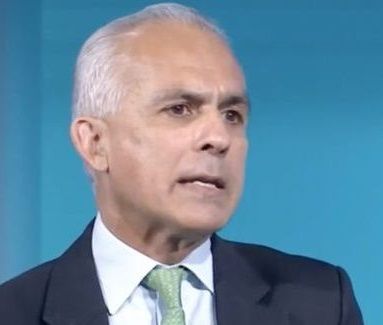Practical Plans For NHS Reform: Reform UK Pledges for Our Top-Heavy Health System
Reform UK Deputy Leader Dr David Bull recently spelled out the three problems that we need to solve in the NHS. They are Staff, Systems and Technology.
The NHS waiting lists stand at 7.8 million people. That, by the way, is a fiddle, due to the way NHS Trusts invite people off the lists and for other reasons. Almost everyone has experience themselves, or through a family member of the NHS failings recently. It’s a very large and complex problem.
And now recently the British Medical Association, which is the trade union of doctors, has morphed from a benign body representing doctors’ best interests into a politicised left wing group, seemingly determined to topple the government at all costs.
That’s the personal feeling of many people. But doctors like Rob Lawrence, and Emma Runswick, who, by the way, is a former Momentum activist, should be ashamed. They are making patients suffer in pain and distress. There’s hardly been any weeks during 2023 when the NHS functioned without industrial action. It’s not that we can’t have sympathy with the pay and conditions of the nurses and junior doctors in particular, but there’s no doubt the NHS has become highly politicised and it needs to change.
Make no mistake, people will die as a result of this action. Now consultants and junior doctors are bragging of their camaraderie. They're doing so openly on the British Medical Association website.
At the same time while saying this, they're profiteering. They're commanding as much as £7,900 to cover a single shift during the strikes. And what's worse is they're doing it in tandem. So one doctor covers for a colleague, receives that vast payment. The next day they swap roles. And then that doctor gets the same payment. That cannot be right.
The cost of providing locum cover up to August of 2023 has been in excess of £1 billion. That is our money. It's taxpayers’ money, which should be going into patient care. It should not be going into a political movement. At the Reform UK Conference 2023, deputy leader Dr David Bull spoke passionately about the need for NHS reform. It was truly refreshing to hear detailed policy proposals from a medical doctor, rather than the platitudes and waffle that we’re used to hearing from health ministers. If we really care about the NHS, then it has to reformed and made fit for the future, in the interests of both patients and healthcare workers.
Now, Phil Banfield, the Chair of the BMA Council, has said recently that if this government was serious about patient safety, it would not have deliberately run down the health service over the last ten years, with a terrible adverse effects that austerity has had on the health of the nation every day. There’s a kind of conspiracy theory that the Conservatives want to run down the NHS to make way for privatised services run by their political friends. But let’s be clear about that.
That is really nothing more than propaganda, lobbying for an even bigger pot of NHS funding, and it's simply not true. When you look at the management of the NHS, the NHS has never had so much money. We spend 11.7% of GDP, roughly the European average on the NHS, and our outcomes are dreadful.
A million patients in England have experienced a delay in their cancer care since Rishi Sunak became Prime Minister just ten months ago. Our survival cancer rates for nine out of the ten most common types of cancer are lower than European countries. And because we're missing all of our targets instead of dealing with the problem, can you guess what the government's done? The government, in its infinite wisdom, has now decided to scrap two thirds of the targets. So ten targets are now reduced to three.
We should never have been locked down in Covid and there’s ample evidence for that from Sweden and elsewhere. You see the lack of political leadership, chaos and the infighting in the release of the Covid transcripts of government communications. The government panicked. They believed the modelling that simply wasn't true. And now it transpires it's worse than that. They actually cherry picked their evidence to reinforce their insane draconian rules. The government presided over a catastrophic policy of discharging patients from hospital into care homes. And they didn't test them for Covid. And all of us now know the devastating results that occurred as a result.
They consigned elderly people to death and this is the best description we can put on it. This government is presiding over a system of mediocrity. At worst, it's catastrophic failure. And between the Government and these militant unions, if they continue, at this rate, there will not be an NHS left to save. It has gone from a National Health Service to a National Health Shambles.
Staffing reforms
In the conference Dr David Bull spelled out the three problems that we need to solve. They are Staff, Systems and Technology. Staffing and all the issues around training and the every day problems on hospital wards are important, because underpinning all of this industrial action is really deep, unhappiness. And we need to understand that. It is true we should pay doctors more, especially junior doctors. But it's more than that. It's not just money. It's about how they feel. They need to feel appreciated. They need to feel love. They need to feel supported.
They don't get that at the moment. We need to provide simple things like hot food in hospitals, on-call accommodation, training opportunities and really good prospects. And fundamentally we need to train more doctors and stop ‘stealing them’ from abroad.
And guess what? The government is now listening to Reform UK because that is now Rishi Sunak’s pledge came about to increase the numbers of doctors in training. On top of that we need to make sure we're training the right people to be doctors. We want it to be a meritocracy, and in fact our whole country could do with a strong dose of meritocracy. We want medicine to be a career for everyone from all social classes, not just because mummy and daddy are able to support Tarquin or Fifi through medical school. The NHS culture will benefit a lot from recruitment from the inner cities, from those people who really know what it's like to struggle to fight, who understand poverty, who understand deprivation. And we need to empower them. And this is how we want to do it.
What we need to do is to remove the insane amount of debt the training causes. So at Reform UK we believe passionately that the government should enter into a contract with the students where on qualifying they are then bound to serve ten years in the NHS.
And in return for this contract, when a newly-qualified doctor pledge ten years of their life, what we will do is underwrite the cost of their training. We will pay down their debt as they then serve in the NHS. And the same isn't just for doctors. The same will go for nurses, for radiographers, for physiotherapists, and so on. What we as do will make their lives and their prospects better. And what that will also do is engender loyalty and create better patient outcomes.
What's more, Reform wants to solve the staffing crisis and we will stem the exodus of trained staff leaving for foreign countries so early in their careers. We need to rid the NHS of the insane amount of managers, the 48% of the staffing budget, including those diversity and inclusion managers and directors, some of whom are paid even more than NHS trust bosses.
Yes it’s a whopping 48% of the staffing budget that is non clinical. That is wrong. It's immoral. It’s a pattern of waste that we see across government by the way, throughout the civil service and the Ministry of Defence for example, where numbers of civilian workers are almost equal to the entire British Army regular forces. We have the equivalent of one Rear Admiral, salary £105,000, for every single fighting ship in the Royal Navy.
System reforms
This waste must stop. We also need to cut out the NHS bureaucracy and bring services closer to the people, in the chain from primary care to care in the community to A&E. We also need to cut out the inefficiency. We need to let doctors exercise clinical judgment and let them take the decisions. We also at the same time need to allow nurses, allied healthcare professionals to make clinical decisions, not managers. We know this from talking with frontline NHS workers, often managers get in the way of good medical decisions, and often slowing down processes.
We don't need to exagerrate this, but the NHS is like a giant oil tanker and it's very, very slow to turn it around. It's actually worse than that. It's not one ship. It's many vessels or with different destinations or with different navigation systems. It’s not that long ago, in the 1980s, that the NHS was one organization.
It was then split into self governing trusts, each with their own boards and management. They then grew as they grew. They took over each other. They created bigger and bigger trusts. And they created monoliths as they've done that. We're now in the insane situation where we’re almost back to where we started. We have actually replicated the picture of the original monolith organization. But in so doing we have added far more managerial structures and far less efficiency. Some bright spark thought it was a great idea to cut hospital beds whilst the population increases.
We had over 240,000 hospital beds in this country in 2000. We have 140,000 now in 2023. And as any hospital doctor will tell you, if you haven't got a bed, you can't admit anyone. So you can't admit anyone from A&E because obviously you haven't got any capacity. That means you can't actually operate on anyone because you haven't got any beds. So the whole bed crisis is exacerbating what is actually going on in the frontline A&E. It's a very simple game. If you haven't got capacity, you can't move anyone. So no beds. That means everyone's stuck in A&E, which means the ambulances are on the ramp. That means that no one comes in. That's why the ambulance response times are so long.
So what do we need to do in this country is to invest in social care because there are lots of people stuck in hospital who don't need to be there. If we don't have social care places and a joined up system we simply can't discharge the elderly. If you can't discharge the elderly, you have no beds. And so you can understand, the picture continues.
As well as doing that we also need to invest in primary care. We need to get away from small GP style of organizations. We need to see big diagnostic and treatment centres and more shared infrastructure in areas so that primary care can take some of the load of minor surgeries and treatments like dermatology and mental health. We need to open these, let’s call them super practices and local clinics every day of the week. We need to revisit the GP contracts with the issues that were left from the time of PM Tony Blair onwards. And we need to relieve pressure on A&E. And what we need to do is we need people to remember this maxim of ‘pharmacy first, GP second, and A&E last’.
What we need to do at the same time is to remove a lot of the vested interests and the sheer political conflicts from the system. Fundamentally, and Dr David Bull talks about this all the time on his TV show, we need to stop being so short term in our NHS planning. What we need to see is a 20-year cross-party strategic plan.
We can go a step further and state that we need to depoliticize the NHS entirely. And whist we’re at it, can we stop being so politically correct, with things like rainbows across NHS car parks and hospital buildings. Can we protect single sex wards and women’s spaces? Can we see an end to being obsessed with NHS training courses for pronouns and virtue signalling? None of these things are actually helping patients.
And what on earth is an NHS ambulance trust doing giving men a year off for believing they have symptoms of the andropause? In case you don't know what that is, it is the male version of menopause. Many doctors can't agree whether it really exists. But some men sure have a reduction in male hormones later in life. All men have a reduction in testosterone from the age of about 18. The problem here is, if you have clinically a reduction in testosterone, it's really simple. If you're symptomatic, you treat the symptoms and you get back to work.
Can we also stick to biology? Can we talk about breastfeeding, not chest feeding? The NHS is not plaything for woke ideas or the alphabet mafia. Let’s not pretend there are 50 sexes. There aren't there are two. They're male and female. It’s just the biological facts.
Technology reforms
Now, in regard to technology in the NHS we’re playing catch up. Compared to many other health systems in Europe our systems are harder to interconnect and in France for example, the way they used electronic health records and exchange data between different public and private health providers is something we can learn a lot from.
When we want to do things well, though, in this country, we really are world leaders. But what we need to do in the NHS is work which are the keystone IT projects that are truly transformational, and stop wasting money on spurious IT projects. We need to work with world-leading companies to ensure that patient data is safe and secure. There are no real health data challenges that are just unique to the UK. We don’t need to reinvent the wheel.
As a country, we seem to have such an ostrich mentality about adopting health technology. In fact we have such an excellent track record in messing everything up. The NHS has spent more than £1 billion on storing paper medical records just in the past five years. £1 billion on paper records, equal to around £30 for every single taxpayer. That's money that should be spent on frontline patient care.
Amidst the enthusiasm for these cutting-edge solutions, there is always the risk that the health service will be forking out huge sums to run before it can walk. For context, the NHS an institution which has had to set targets to eliminate the use of fax machines, and see one in seven trusts still relying on paper-based record keeping. What good are AI-powered patient care planning tools if that patient’s records are stored on paper? Are ‘virtual wards’ feasible when smart monitoring systems are rendered useless due to network failures?
At Reform UK we stress a lot about making the NHS more efficient for everyone and sorting out the NHS ‘data layer’ and it’s an important point. Advanced technological structures like the one envisaged for the health service must be built from the ground up, with clean, universal, standardised data forming the foundation. Without this, otherwise worthwhile investments will be rendered useless.
It’s clear that NHSX, the unit created in 2019 to accelerate the digital transformation of health service and social care, has a monumental task ahead of them. The emergence of artificial intelligence (AI) means that the entire fabric of society is on the cusp of seismic disruption, and no one is quite sure whether this will really lead to a digitised paradise or the ‘golden age or productivity’.
What we do know is that the genie is out of the bottle, and the NHS, like most large institutions, is already devoting hundreds of millions of pounds to put AI tools to work. They have to be made to work.
So let's move on to Reform UK and what we believe in, because we believe passionately in patient choice, breaking down inconvenience and creating flexibility. You should be able to see a doctor of your choice when and where you want. Reform UK believes that waiting lists must be abolished and to do that, the NHS has to work with private providers. The money then follows the patient. Reform UK will unleash the power of the private sector to dramatically increase the capacity and waiting list.
And here's our pledge. If you can't see a GP within three days. You are then entitled to use a private GP paid for by the NHS. If you can't see a specialist within three weeks, you can then go to a private specialist again, the NHS providing the funding.
And. If you have to wait more than nine weeks for your operation, not two years, not three years, not four years, nine months. Then again, you can go privately and that bill will be picked up by the NHS.
So just think about it. What does this actually do? What it means is great service provision will be rewarded, allowing great operators to grow. Improved competition and improved choice for you, and for me, and for the public.
We also believe that tax breaks should be given to encourage people to take out private health care. It is absurd that currently you cannot offset that cost against tax so that holders of private medical insurance are effectively paying twice. Now, if you made that change, more people would take our private medical care. That reduces the burden on the NHS as well.
We also need to empower the public to use technology and health apps. We want to see rewards for good positive behaviour, rewarding healthy eating and drinking. Stop telling people what to do, encourage them what to do. And we need to encourage exercise and discourage a sedentary lifestyle.
Reform UK has its Health Committee led by Dr David Bull, and they’ve been coming forward with a lot of excellent policies, many of which have been copied by the Conservative Party. In many ways we should be flattered. And here's the telling point though, when they do adopt our Reform UK policies, the Conservatives go up in the poll ratings. And what does that mean? Well, it means that we are right.
But here's the really salutary lesson. The Conservatives are all talk, and they are all bluster. Nothing will change under the Tories. If we truly, truly believe in the concept of the NHS, if we want the NHS, if we need the NHS, then the whole system must be reformed. The time for idle talk is over, it is now time for delivery and it's time for reform.






